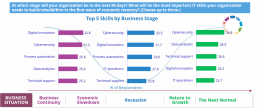The COVID-19 pandemic has made many of us re-evaluate what’s important — and what perhaps not so important. Many jobs and functions that have been taken for granted for years have suddenly shown themselves to be key to society and organizations coping — even surviving. This also applies to tech roles and for digital skills.
The Lockdown Forced a Rethink
The rapid lockdown across countries forced organizations to scramble and to rethink business operations quickly. Priorities changed, including the evaluation of which technology skills were needed to make the day-to-day business possible.
However, at the same time the lockdown also forced many organizations to fast-track transformation projects that may otherwise have been red taped for a while, purely to continue to deliver their services and products to their customers.
As one CIO of a large logistics told us: “Projects that may have been slow to get off the ground have now become “speed boats”. Not all of them will be successful but our company is willing to try more new things.”
IT Skills Take Center Stage on the Road to Recovery
This all impacts how organizations are thinking about the IT skills that they need to survive, to maintain, and to rebuild. In Wave 6 of IDC’s bi-weekly European IT Buyer Sentiment Survey, which we have been running since March 2020, we asked respondents which skills would be most important for them in the near future, and some interesting patterns emerged.

For organizations that are still focused on business continuity, digital innovation skills are deemed most important. They realize that their road to recovery will need to involve secure, innovative use of technology.
They are also looking for skills to help them automate processes for cost optimization and for expertise in data analytics to be able to make quick, informed decisions in a volatile situation. In addition, they need technical support to ensure business continuity as well as to help the workforce get to grips with new technology.
Those businesses that are expecting to enter recession are putting a premium on digital innovation and cybersecurity skills as well. Interestingly, though, IT operations skills are now deemed important. A continued focus on driving down costs means that businesses are looking at how they can lower the “keeping the lights on” part of their IT budgets, which often is as much as 60%.
This could involve switching to cloud wherever possible.
Respondents to our survey that believe they have turned the corner and are firmly on the road to recovery have somewhat different priorities. Cybersecurity stands out as the most important skill set to ensure the business in the growth phase.
Data analytics skills are needed to create a data-driven organization, which is part of most businesses’ digital transformation efforts. But ensuring a stable, efficient IT backbone is key, hence the focus also on technical support and IT operation skills.
But How Do You Secure the Skills You Need?
Another impact of the pandemic has been a renewed focus on the need for training and learning for employees to be able to pivot to the new work environment. We’ve seen from the survey mentioned above that European organizations have increased their spending — especially on remote learning (virtual instructor-led courses as well as self-paced learning offerings).
However, training and upskilling will not be enough. We had a tech skills gap in the market before the pandemic — and overall, this is still the case. We at IDC have mapped out how effective skills management use cases can help organizations on the road to recovery, and how they can help create an agile and resilient organization that can better withstand shocks to the system.
We’ll return to this topic in a later blog.
But one thing is clear: the value of having a skilled workforce that can quickly adapt to changing environments and pick up new skills when needed has crystallized through the pandemic.
If you want to learn more about this topic or have any questions, please contact Marianne Kolding, or head over to https://www.idc.com/eu and drop your details in the form on the top right.

